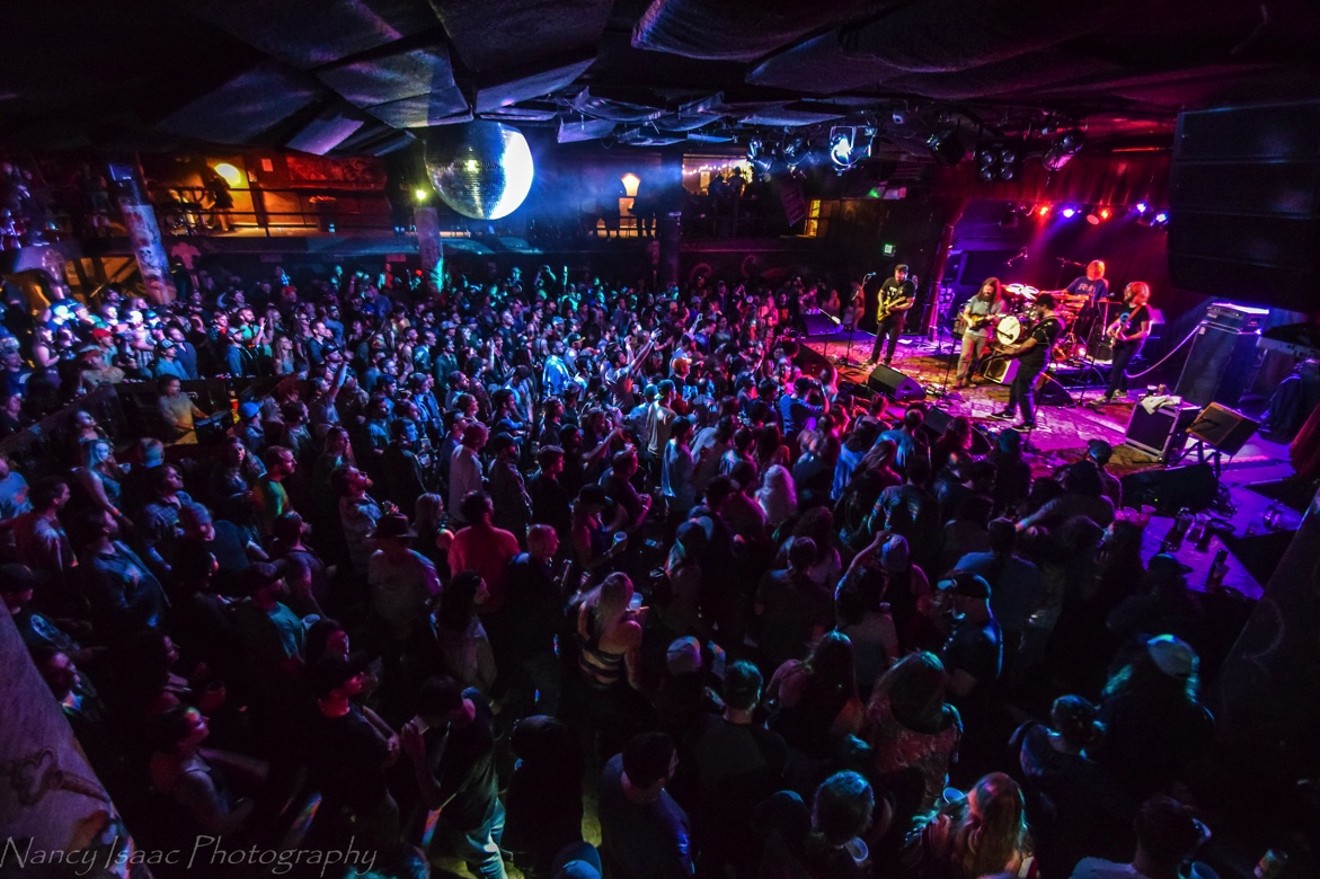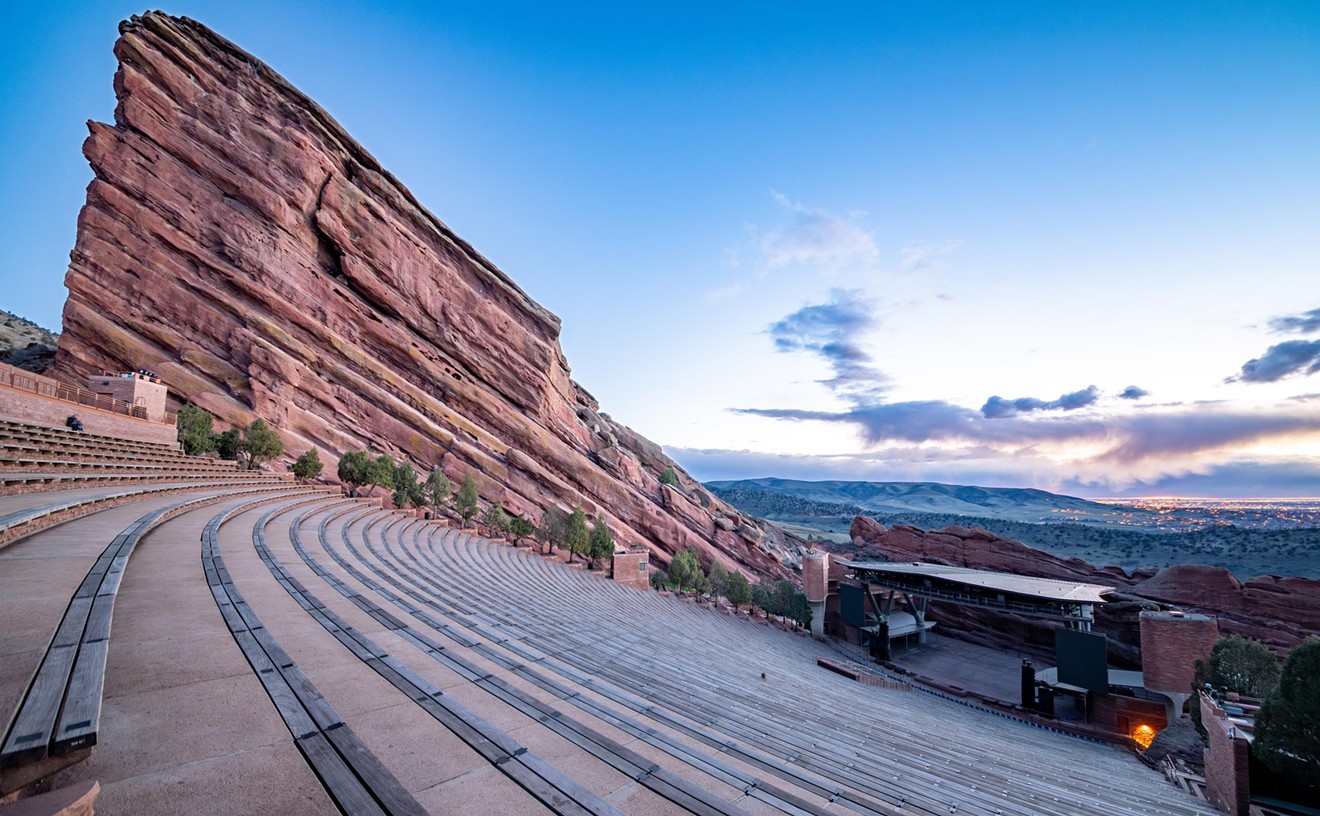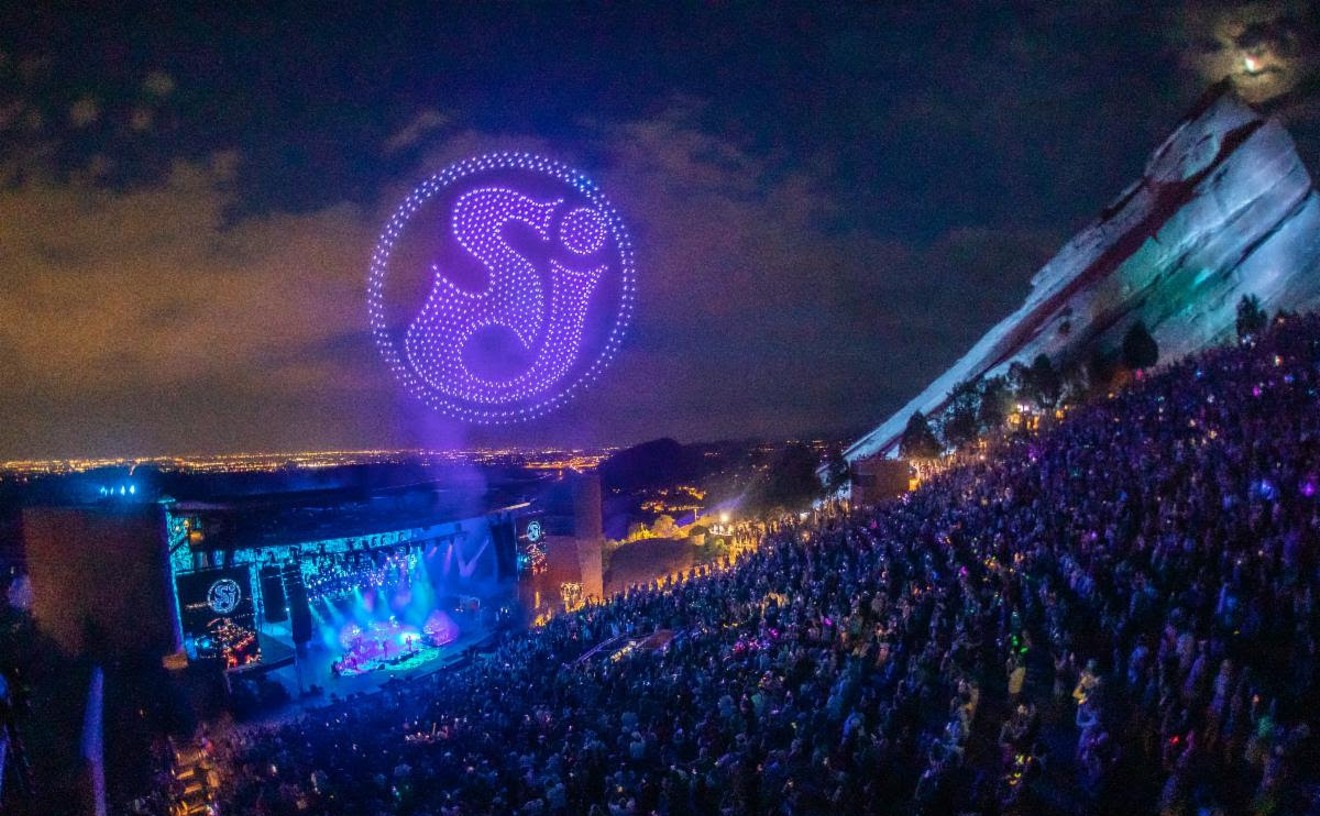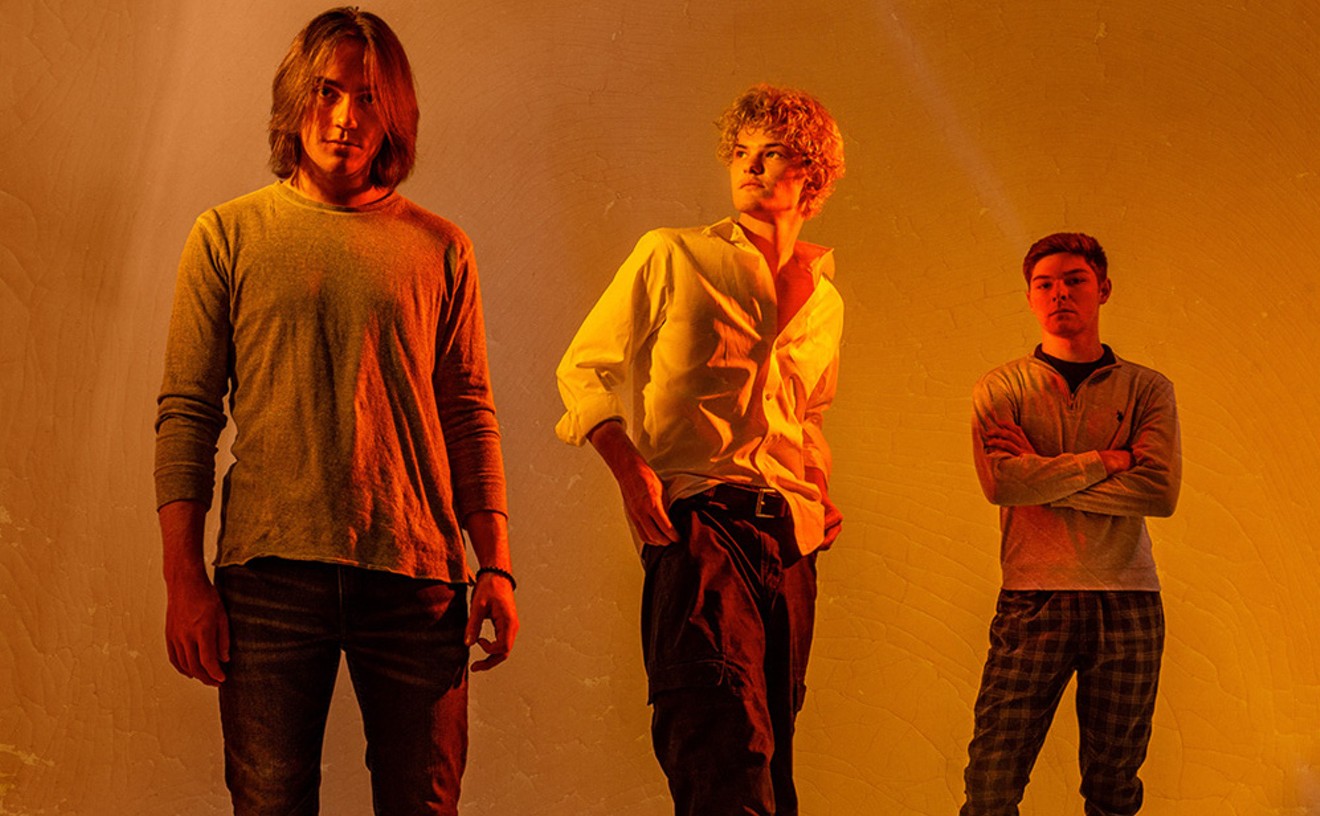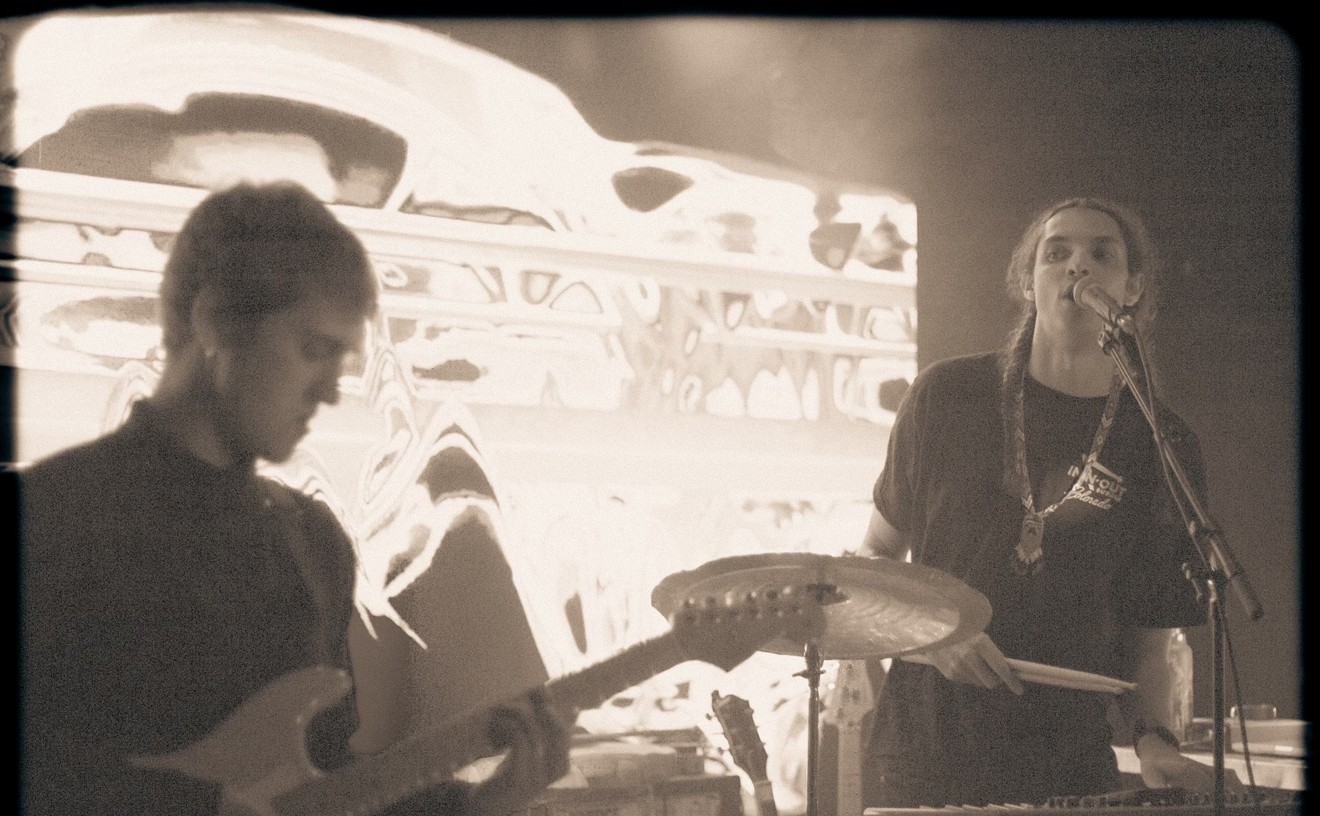Two years ago, venues were forced to close their doors as the COVID-19 pandemic swept across the United States and Governor Jared Polis ordered non-essential businesses in Colorado to shut down as of March 24. But now, as positive cases have plummeted and restrictions have loosened, music venues are regaining some sense of normalcy.
Westword asked the owners of many local venues what they've learned over the past two years and what they're looking forward to in the future. Here are the answers from Cervantes' Masterpiece Ballroom, the hi-dive, the Black Box and Your Mom's House.
When your venue closed because of the shutdown, what were your main worries? Did you have to furlough employees?
Cervantes': Our main concern was how long the pandemic would last. There was so much uncertainty, especially during the first couple of months. All of our staff has been impacted in some form because of the shutdowns. We did our best initially to keep as many of our staff on payroll as possible, but we were only able to sustain that for a few months. Luckily, a lot of our staff were able to earn unemployment and take advantage of the weekly additional pay that the federal stimulus packages provided.
Hi-dive: The main worry at first was absolutely the employees, because we were thinking it would only be a two-month thing. We laid everyone off so they could collect unemployment, and tried to be as helpful and as present as possible during that time, but as the pandemic started to look like a much longer deal, the fear became being able to reopen at all. We felt like the hi-dive is an integral part of the Denver music scene, and with LiveNation and AEG trying to take over the city, it felt extra important that we stay open and stay independent. Just weather the storm. Luckily, the city seemed to feel that way, too.
Black Box: The Black Box was shut down for the majority of the time. Unfortunately, we did have to furlough all of our staff.
Your Mom's House: Not being able to open again. We were closed three separate times for a total of five months in 2020. [YMH did not have to furlough employees.]
How would you say your venue was able to survive the pandemic?
Cervantes': We had a decent-sized reserve that allowed us to survive the first few months. We received stimulus from the government, also. If we hadn't received that stimulus, we probably wouldn't have made it.
Hi-dive: There's no way we would have survived the pandemic without the support of the community. It was overwhelming. We were constantly having to restock our merch online, which was nice, because we got to give some business to our friends who screenprint, as well. We offered a "ticket credit" program online where you could basically pre-pay in advance for upcoming shows, which over 200 people purchased. A ton of bands did stream performances and made merch and put albums up for sale and donated the money to us. Bands would come in and film a livestream or a pre-recorded set, and we would be able to pay a sound person and collect a little room fee/donation.
We also just hustled. [We] submitted for every grant we could, and we got a ton. We also were waiting on the "Save Our Stages/Shuttered Venue Operator" grant, which took forever to come through but was very helpful. Just sort of anything we could do or any aid we were eligible for, we went for. It was a very hard time, but there were so many small victories along the way that it just sort of kept us moving forward.
Black Box: The Black Box survived the pandemic largely due to the support of our fans and supporters. We kept events going via Twitch and also focused on leveling up our merch game.
Your Mom's House: We were able to think outside of the box and get creative with our events. When the city had the 10 p.m. (and then the 12 a.m., then the 8 p.m., then back to the 10 p.m.) curfew, we had to adapt on the fly. Throw in the ever-changing curfews with the fluctuations in our venue's capacity (reopening with 50 percent limited capacity, then moving to 25 percent of your capacity, then to 100, then back to 50 to 75 capacity), the city/state always kept us on our feet. We applied for the 5 Star Program (and got accepted) in 2020, and that allowed us to stay open later and have an increased capacity. [We] rolled up our sleeves and got dirty in renovating our venue for the five months we were forced to stay closed, especially within the first three months. We renovated both bathrooms, the venue bar, the sound booth, the floors, green rooms and more. Being shut down really encouraged us to make YMH the best venue we could possibly make it with the time we had to renovate it. Renovations were all done in-house, and that's how we were able to save a lot of money going that route. We applied for the PPP loans, and that helped us out tremendously as well.
When did your venue open its doors again? What difficulties did you face in reopening?
Cervantes': We were shut down completely for five and a half months, March through August 2020. We reopened the last weekend of August 2020 but were forced to operate in a completely different fashion and with a severely restricted capacity. For ten months, we only hosted seated, socially distanced events and operated at 10 percent of our normal capacity. For a short stint, we operated without any restrictions in place, June and July 2021. Delta hit in July 2021, and as of August 2021, we began requiring all attendees to provide proof of vaccination or proof of a negative COVID test. This was self-imposed — it wasn't required by local or state governments at that time. Safety is our main priority, and in order to keep everyone safe, we’re meeting or exceeding all of the guidelines set forth by the state. Fast-forward to March 2022, and it feels as close to "normal" as it has in two years.
Hi-dive: We were open sporadically throughout the end of summer/early fall 2020, but it was strange. It was when you had to be masked and sit down and offer food (which our next-door neighbors at Sputnik helped us out with). We turned the stage room into a kind of beer garden, with string lights over the random collection of tables and chairs we pulled together. We hosted movie nights and had one "social distance" show with our friend Dylan Earl from Arkansas. We opened back up in April 2021 and were tentatively booking for the late summer/early fall when the mayor abruptly decided it was back to business as usual, so we had to hustle again to get some programming going. We tried karaoke nights; we were cold-calling local bands to play, and a lot of them would tell us, "We haven't practiced in a year!" But once we got rolling, we were back in business.
[We were] surprised at how much stuff needed fixing/replacing after almost an entire year out of commission. The building is old to begin with, and a lot of the fixtures that we turned off (beer coolers, etc.) just never turned back on again. Most of our pre-pandemic staff had sort of pivoted to new careers, so we ended up with a mostly new crew. We had a lot of pushback from a very small group of people who didn't like our mask or vaccine policy — one loser even trashed us online as "losing our punk card" because we asked patrons to be vaccinated. That stuff, while trivial, got a little annoying. But for every one person who threw a fit when we asked them to put on a mask, we had hundreds who came and did it willingly. So it became more of a joke than anything.
Black Box: We started throwing shows on our patio again in July and then moved inside for seated events in September. I found the most difficulty in dealing with the weekly changes with restrictions. During that time, we literally would have to change our event and safety plans around on a weekly basis to be in compliance and ensure the safety of our staff and patrons.
What lessons have you learned from the pandemic experience?
Cervantes': You learn not to take anything for granted, that's for sure.
Hi-dive: I think we learned a lot. I think mostly we learned how Americans can't come together about anything and that ultimately humanity seems doomed to eat itself alive. But I will say that the pandemic maybe was one of the best things to ever happen to the hi-dive. When you are caught up in the day-to-day grind of any job — especially something specific like running a music venue — you can lose sight of what you are doing and, more important, why you are doing it. I think we had become a little stagnant pre-pandemic, and this reset forced us to re-examine our priorities.
Black Box: The pandemic has shown that we are all the same. It has connected us in a way, shown that we do need to all stick together. It was a reminder that our life is a gift and that we should appreciate every moment. Personally, I have learned how important self-care is, which in turn makes me a better leader. As a team, we have learned a new level of flexibility and resilience.
Your Mom's House: Soooo many. Too many to list. Running a music venue and bar is a never-ending learning experience. Especially a bar/music venue that's located in the most densely populated neighborhood in the heart of Denver, that also just so happens to be two blocks from Colfax. It's a very "trial and error" type of industry, too. We live and learn and get stronger and wiser from all the experiences that come our way.
Any big plans for this year or hopes for the future?
Cervantes': My hope for the remainder of 2022 is that we're able to re-establish that feeling of "normal."
Hi-dive: Our calendar for this coming year is stacked all the way through the fall, and we are in the middle of something like 23 events in a row in March. We just signed a ten-year lease on the building in November of last year, so we're in it for the long haul. I personally am in this till the bitter end, which was my attitude the whole pandemic. We have dealt with a lot of crises over our time here, and whatever the next crisis is, we will weather that, too...with a little help from our friends. As long as people want to support the local music scene, we will be here to give them the space to do so.
Black Box: The pandemic has ensured a new level of connection within our team, supporters and artists. We have been focusing on new ways to connect with our fans through streaming and have been working hard to provide quality content even now while reopened. As for events, we have some really special nights planned and are focusing on bringing back our international artists who have been unable to travel during the pandemic. Our mission has always been to move people through sound, not hype, and we plan to continue to do just that.
Your Mom's House: Absolutely. Again, too many to list. [There has been] expansion in many ways. We're already going back to having a show every single night, so pretty much seven to ten shows a week. All genres are represented, so you'll see all walks of life come through here. Supporting the local community and the up-and-coming music and arts scene is what we ultimately pride ourselves on. We will continue to support our vision all while being that "music discovery" venue that everyone can count on to see this state's and nation's best up-and-coming artists of all genres. We have a killer April lined up, and from there the momentum is just gonna keep on keeping on!
[
{
"name": "Air - MediumRectangle - Inline Content - Mobile Display Size",
"component": "12017618",
"insertPoint": "2",
"requiredCountToDisplay": "2",
"watchElement": ".fdn-content-body",
"astAdList": [
{
"adType": "rectangle",
"displayTargets": "mobile"
}
]
},{
"name": "Editor Picks",
"component": "17242653",
"insertPoint": "4",
"requiredCountToDisplay": "1",
"watchElement": ".fdn-content-body",
"astAdList": [
{
"adType": "rectangle",
"displayTargets": "desktop|tablet"
},{
"adType": "rectangle",
"displayTargets": "desktop|tablet|mobile"
}
]
},{
"name": "Inline Links",
"component": "18838239",
"insertPoint": "8th",
"startingPoint": 8,
"requiredCountToDisplay": "7",
"maxInsertions": 25
},{
"name": "Air - MediumRectangle - Combo - Inline Content",
"component": "17261320",
"insertPoint": "8th",
"startingPoint": 8,
"requiredCountToDisplay": "7",
"maxInsertions": 25,
"watchElement": ".fdn-content-body",
"astAdList": [
{
"adType": "rectangle",
"displayTargets": "desktop|tablet"
},{
"adType": "rectangle",
"displayTargets": "desktop|tablet|mobile"
}
]
},{
"name": "Inline Links",
"component": "18838239",
"insertPoint": "8th",
"startingPoint": 12,
"requiredCountToDisplay": "11",
"maxInsertions": 25
},{
"name": "Air - Leaderboard Tower - Combo - Inline Content",
"component": "17261321",
"insertPoint": "8th",
"startingPoint": 12,
"requiredCountToDisplay": "11",
"maxInsertions": 25,
"watchElement": ".fdn-content-body",
"astAdList": [
{
"adType": "leaderboardInlineContent",
"displayTargets": "desktop|tablet"
},{
"adType": "tower",
"displayTargets": "mobile"
}
]
}
]

